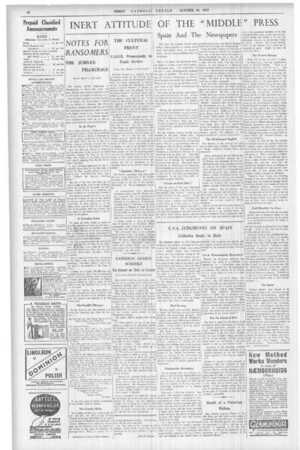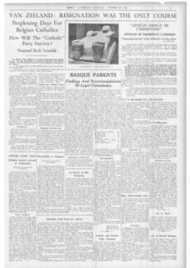Page 12, 29th October 1937
Page 12

Report an error
Noticed an error on this page?If you've noticed an error in this article please click here to report it.
Tags
Share
Related articles
" In Franco's Spain "
Gen. O'duffy Accuses Capt. Mccullagh And Efen S Rich Brigade
En Lish Red Monopoly Of Propaganda Bro En For First
" I Am Frightened By Modern Warfare "
There Was An Army Plot But
Spai And The Newspapers
This week lishes a final Capt. McCu Spain, which November. the Catholic Herald pubselection of extracts from lag/i's book, In Franco's is being published early in
There is no oubt that the British Press has failed in its duty in this vitally important European issue. The whole Press of the Left at once whole-heartedly espoused the cause of the Reds. The Press supporting the National Government of -Britain, which includes not merely the Conservative Press in the full sense, but the Press of the great mass of 'the Middle endeavoured to take no side at all.
There were v rious reasons, some respectable, some dis reditable, for this. Among the respectable reasons was a natural prejudice against w at seemed to be a military rising against the legitimate civil Government.
Among the discreditable were resentment of the undliation recently inflicted on British p licy by Mussolini in connection with A yssirua (Mussolini's responsibility for flranco's rising was very cleverly expl 'ted by the Reds)and hatred of Catholici . especially in the integral Spanish tort .
But the str ngest motives for the inert attitude of t e great Middle Press, of which The Ttes is the leader, were these. First it was d sired to prevent the Spanish conflet, with all as exacerbation, from becoming an issue in British politics—a respectable mo ive, but depending for its realisation a Considerable measure of cooperation frot the other side. Secondly, it was felt at nee that England's duty and interest lay in leaving the Spaniards to settle theirquarrel. This again was a had reason 7S abstaining from informing
t British opinio on the merits and nature of
n
that quarrel, ore especially when one side of that quarr I was being enthusiastically championed by the Left Press, with its enormous po ular audience.
" Fau ts on Both Sides"
Thus the s ogan of the most influential British organ. . so far as they were not enthusiastically Red became " nothing to choose between the two parties," " equal
atrocities on both sides." Friendship for France caus4 a singular and highly dangerous silence as to the extent of French intervention. 1 That of Russia was admit
ted, but glos and Italy wat ed over. That of Germany exposed to the full force of
the sound moral feeling against intervention in an internal question, coupled with a
perfectly natural fear that British Mediterranean interests might be compromised.
It may be freely admitted that the idea of non-intervention as a .British and 'European duty, and as the only means of avoiding a general European war, was at the root of this editorial policy. But it is never safe to play with the truth. The first British interest, the first interest of a democratically governed country, lies in knowing the truth. It is the postulate on which democracy rests, that the ordinary man who reads his newspaper is fairly informed on vital matters. But here, in a vital matter, the truth was virtually suppressed.
True, The Times published articles from its Madrid correspondent and others which opened the eyes of men capable of forming their own opinion. But what it put in its foreign news was virtually contradicted in its leading articles—equal atrocities on both sides, the intolerable intervention of the " dictator " countries, after all the legitimate Government, etc., etc. Hence the ordinary middle-class Englishman is on the whole anti-Franco. Mildly so, for he has heard things about the other side which he cannot wholly ignore, but still he feels that if Franco wins, it is the end of liberty in Spain, whereas if the Government" wins, though there will be a segrettable period of harshness and even outrages, in the long run, Spain will become a parliamentary country, like England, i.e., as nearly perfect as it can be in this world.
The Ill-informed English The Nemesis of this betrayal of truth has not been long in coming. The problem of foreign volunteers became more and more acute.
Quite overlooking the fact (which has never been sufficiently stressed) that it was France that prevented the first nonintervention pact from including personnel, and the fact (which had been studiously glossed over) that Franco-Russian imported personnel had actually prevented a speedy termination of the war, the possibly equal, certainly not superior or more effective, imported Italian personnel on Franco's side was made to appear a scandal of the first magnitude.
The trouble is that the German and Italian governments and their public are much better informed, and naturally they take the British protests as partisan (as indeed they are) and typical of British hypocrisy.
And so we see the first great failure of British policy, right as was its startingpoint and as is its cardinal object, of general abstention from interference. Germany and Italy were perfectly right in try
ing to get personnel included in the first non-intervention pact, and Britain was miserably wrong and untrue to its own and European interests in not forcing France to agree, Answer : the French Government of the Popular Front could not be expected to agree. Reply : so much the worse for them. ...
The Present Danger
" When will the war be over?" I asked. " In three years," was the instantaneous reply of Percival Phillips. " That is, if France and Italy keep out of it. The
danger is that after Franco takes Madrid, and begins to advance on Barcelona, the Spanish Government may do some mad thing to bring about a European war. In Valencia there is still some sanity at top, but if things become desperate, that may go, and Europe may find itself confronted by lunatics. Even now, the Spanish Government has not got full control of its armed forces on land and hardly any control of its armed forces in the air -and underneath the sea. The corps d'ehte of their army is the International Column, which saved Madrid and which is entirely foreign. Most of the aviators are young Russians who have probably been instructed by Moscow to bomb Italian and German warships every time they get a chance. Similar instructions have probably been given to the Russian naval officers who are commanding Spanish submarines; and, when things become desperate, the 'Spanish aviators and submarine commanders in the service of the Valencia Government are quite likely to attack Italian and German warships on their own initiative.
"It must be admitted that the Spanish Government has not got much control over its soldiers, sailors, and aviators, otherwise there would not be those disgraceful massacres of prisoners and hostages, which are still going on. When I was last in Gibraltar they showed roe a confidential report from a most reliable British engineer in Malaga, who said that every time the Nationalists dropped bombs on Malaga an armed mob broke into the jail and murdered fifty or sixty people, while the
regular ' soldiers looked on, delighted.
" Similarly, when Varela was attacking Madrid at the end of October, the militia dragged over one thousand hostages out of the Cdrcel Modelo and slaughtered them in
the adjoining cemetery. A government which cannot prevent those crimes from being committed in the full light of day on its very doorstep won't be able to prevent Red Russian airmen, away off at Formentern or Oran, from dropping bombs by night on German warships."
Cold Shoulder for Duce
Bustametue has also made me see, quite clearly, that if Mussolini thinks he can get anything out of Franco, in the nature of a territorial concession, he makes a great mistake; the cold shoulder is all that he is ever likely to get. Even I, who only wanted bare civility, did not receive it.
In an anti-Franco book published in England, under the title of Italy over Britain, the author takes it for granted that if Franco wins, Spain will become an Italian outpost in the Atlantic. Nothing so exhilaratingly absurd has been written since Alice in Wonderland. Mussolini and Hitler will be paid a fixed amount in ready money and minerals, but this payment will never become a permanent charge on Spain, and no interference with Spanish sovereignty in Spain, itself, or any of its possessions, will be tolerated by this proud and sombre people, so indifferent to material things, so quick on the point of honour. Probably in a year or so we shall see Spain accepting from Great Britain help to resist Italian pressure....
Up! Spain
"Franco doesn't want himself to be treated as a mystery, but the group around him insist that this is necessary. As for the other generals, all of them save Mola, are certainly not so approachable as any of the generals you and I have met elsewhere. Some, who know English and who have travelled in Great Britain and America, are anxious at first to be friendly with Englishspeaking correspondents, but soon they are warned off by Press censors, or by their
own superiors. The result is a chilliness such as I never experienced anywhere in my life before, save in an ice-house." . . .
I forgive Captain Bustamente, for I recognise that his ferocious severity as a censor is due to his youth, his inexperience, and his fervent love of Spain; and I conclude this book on the Great Civil War, with the cry : Viva Espana! Viva el General Franco! Viva el Ejercito Salva dor. Arriba Espana!
blog comments powered by Disqus

















